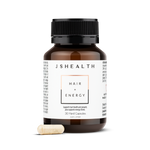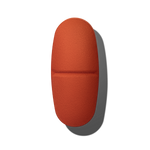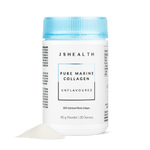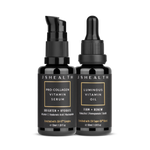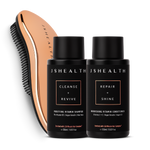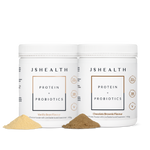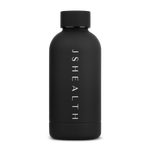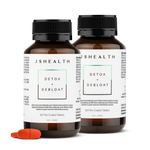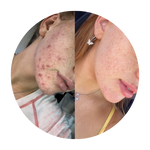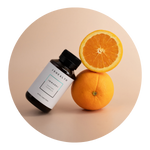The Importance of Vitamin D
What is Vitamin D?
Vitamin D is a fat-soluble vitamin, needed by our bodies to maintain healthy bones, nervous system health and a strong immune system.(1)
It comes in 2 forms:
- Vitamin D2 (ergocalciferol): This comes from plant sources, and is also found in fortified foods like milk or yoghurt.
- Vitamin D3 (cholecalciferol): This is produced in your skin when you are exposed to sunlight. It's also found in some animal foods and supplements.
To work effectively in the body, Vitamin D needs to be activated and turned into a hormone - a process that is carried out by your liver and kidneys.(2)
Why is Vitamin D important?
Vitamin D has a range of functions in the body, including:(3)
- Form our bones and teeth: Vitamin D helps our bodies absorb calcium and phosphorus from food, which are crucial for building (and maintaining) strong bones and teeth.
- Help our muscles contract: It also aids in the absorption of calcium, which is essential for muscle contraction and overall muscle function.
- Help nerves carry messages between the brain and the body: Vitamin D plays a role in nerve cell function by supporting the maintenance of the myelin sheath, which helps nerve signals travel efficiently.
- Keep our cells functioning well: Vitamin D is involved in regulating cell growth and repair, helping cells function properly and reducing the risk of abnormal cell growth.
- Support a healthy immune response: Vitamin D boosts the immune system by enhancing the production of antimicrobial proteins and promoting the activity of immune cells that help fend off infections.
What are dietary sources of Vitamin D?
While Vitamin D is found in food sources, it's often in very small amounts. Statistics suggest that people only get about 10% of their daily Vitamin D from food(4). Foods that contain vitamin D include:
- Oily fish like salmon, mackerel or sardines
- Egg yolks
- Mushrooms. Did you know? If you leave your mushrooms in the sun for 15 minutes before eating it increases the Vitamin D count!
- Fortified foods (Vitamin D added) such as milks and yoghurts.
Try our Founder Jess’ Creamy Thyme Mushrooms as a delicious, Vitamin-D rich side for your next dinner.
How much vitamin D do I need from food?
The recommended amount of vitamin D from food depends on your age.
Currently, Australian recommendations are(5):
- Children, teenagers and adults aged 19–50 years should have 5μg (micrograms) of vitamin D a day.
- Adults aged 51–70 years should have 10μg of vitamin D a day.
- Adults aged over 70 years should have 15μg of vitamin D a day.
How can I increase my Vitamin D?
Majority of the population are not able to absorb adequate vitamin D from food alone. However - exposure to sunlight helps!
A main source of vitamin D comes from your skin being exposed to ultraviolet (UV) radiation from the sun.
It’s important to note that not all skin tones should spend extended time in the sun, your absorption of Vitamin D will be greatly influenced by:
- Your skin tone. Naturally dark-skinned people need more UV exposure to produce Vitamin D.
- The amount of skin you expose
- Where you are in the world, the season and time of day (this will all affect UV levels)
It’s important to balance receiving sun exposure to make vitamin D, with the risk of skin damage from the sun. Be sure to reduce time spent in the sun if UV radiation is high (if the UV index is 3 or above) and always keep exposure times to under 20 minutes.
Fun Fact: Whilst you might get sunburnt, you can’t absorb any Vitamin D through glass, so be sure to get outside!
References
- Grant, W.B, Holick, M.F. Benefits and requirements of vitamin D for optimal health: a review. Altern Med Rev. (2005), Vol 10(2), pp. 94-111. PMID: 15989379.
- Bikle, D,D. Vitamin D: Production, Metabolism and Mechanisms of Action. [Updated 2021 Dec 31]. In: Feingold KR, Anawalt B, Blackman MR, et al., (2000).
- Vitamin D - Fact Sheet for Health Professionals, accessed 11th September 2024, at [https://ods.od.nih.gov/factsheets/VitaminD-HealthProfessional/]
- Better Health Channel, Vitamin D, accessed at 11th September 2024 [https://www.betterhealth.vic.gov.au/health/healthyliving/vitamin-d]
- Australian Nutrient Reference Values, accessed 11th September 2024, at [https://www.eatforhealth.gov.au/nutrient-reference-values/nutrients/vitamin-d]
